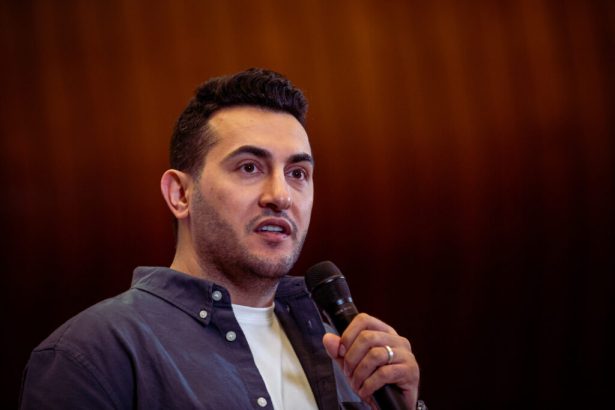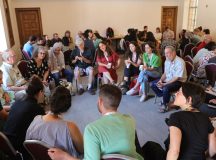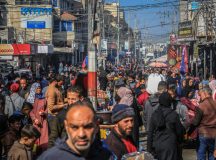Wasim Almasri is the Director of Programs for the Alliance of Middle East Peace (ALLMEP), a coalition of over 160 organisations building people-to-people cooperation, equality, shared society, mutual understanding, and peace among their communities.
Navigating conflict resolution in the context of Palestine and Israel requires understanding the crucial role that youth play in shaping the trajectory of this longstanding conflict.[1] The youth of both nations are not merely spectators; they are active participants, influencers, and the inheritors of a legacy marked by decades of violence and wars. Their perspectives, aspirations, and actions should significantly influence the pursuit of a political solution, making them a vital demographic in the quest for sustainable peace.
In the aftermath of 7 October, the role of youth in fostering peace will only gain increased attention and significance. The deeply rooted hatred, political gridlock, and socio-economic disparities will present significant challenges. This pivotal moment underscores the critical need to recognise and empower a parallel youth track, alongside the conventional political ones, that is built on the foundation of acknowledging youth experiences, aspirations, and grievances, and integrating them into the broader conflict discourse.
This involves creating inclusive platforms that enable active participation and leadership roles. Investing in the capacity of young leaders is key. Equipping them with skills for conflict resolution, diplomacy, and advocacy amplifies their influence in shaping policies and agendas. Thereby, empowered young leaders can challenge the political discourse, initiate grassroots movements, and influence decision-makers to prioritise peace.
Moreover, integrating a youth perspective into the political discourse is essential. Any political conversation that brings in youth representation will ensure that their concerns and visions are reflected in the shaping of policies and agreements. This not only enhances the legitimacy of the outcomes but also ensures a more comprehensive and sustainable approach to peace.
These efforts also require the support of the international community. Channeling resources towards youth-led initiatives, like the ones led by hundreds of the Alliance of Middle East Peace members, reinforces the process’ commitment to nurturing a generation that is capable of steering the region towards a future characterised by equality, security, freedom, and peace.
In the heart of the Palestinian struggle for self-determination, a void persists within the political spectrum – the absence of young voices. The youth of Palestine find themselves marginalised, and their perspectives are often overlooked in the socio-political discourse. This paper, published in 2021 in Palestine-Israel Journal, examines the complex layers surrounding the absence of youth engagement in Palestinian politics and the challenges delaying the rise of youth activism. The piece sheds light on the untapped potential of Palestine’s youth and underscores the transformative role they can play in shaping the future of this region.
UNSCR 2250
A large youth population presents a unique demographic dividend that can contribute to lasting peace and economic prosperity if inclusive policies are in place’. UNSCR 2250
The United Nations Security Council adopted resolution 2250 in December of 2015, recognising the important role youth can play in conflict resolution and sustainable peacebuilding. Member states were asked to promote the engagement of youth in policy making, political participation, and decision-making. While most Israelis under 30 years old had the opportunity to vote eight times since 2006, Palestinians of the same age did not practice their basic right to vote in nearly 18 years.
The absence of a democratic process, accountability, and reconciliation in Palestine, in addition to the Israeli government occupation policies, the high rate of unemployment in the West Bank and Gaza, and the decline in economic opportunities has amplified a case of apathy and hopelessness toward politics and social responsibility among young Palestinians.
In a global survey published by the International Committee of the Red Cross in 2020, over half of the Palestinian and Israeli millennials think that the Israeli-Palestinian conflict ‘will never end’. ‘Of several conflict-affected countries they were the most pessimistic in terms of their views on the prospects for peace’.
But what does progress look like 30 years after the Oslo agreements for Palestinians? And how can experiencing positive transformation inside their communities boost youth engagement in politics and decision-making?
The Conflict and the Political Discourse
This young Palestinian generation has not experienced any progress in the peace process. This can be credited to two different political discourses, neither of which supports returning to negotiations.
In March of 2021, Israel elected an extreme right-wing government that presented radical policies rejecting the idea of a Palestinian state. The Palestinian Authority rerouted their focus to internationalising the peace process by joining treaties and specialised UN bodies. The Palestinian Authority continues to advocate for a two-state solution based on the 1967 borders, a solution for which support has been in decline among local populations, with only 43 per cent support among Palestinians, and 42 per cent among Israeli Jews; the lowest levels of support in years among Israeli Jews.
The absence of a political process and government indifference is forming a political rift, leading to a great sense of insecurity and despair, especially among youth in Palestine. Young Palestinians cannot visualise the future as a time to achieve their aspirations. ‘79 per cent of the youth in Gaza and 70 per cent in the West Bank believe their future is not safe.’
Further, the absence of general elections in Palestine since 2006 has raised many concerns for the performance of the Palestinian Authority’s institutions, which continue to operate without an electoral mandate. In addition, The Palestinian Liberation Organization (PLO) has extended the term of President Abbas indefinitely since 2009, raising even more critical questions on legality and accountability. Currently a staggering 81 per cent of Palestinians believe that corruption exists in PA institutions. (Recent polls indicate that this number has increased since 2021).
Palestinian youth in the West Bank, Gaza, and East Jerusalem are also living through the fear of a military occupation, each with their own identity and human rights context. They are experiencing different levels of violence and discrimination, and they often prove to show symptoms of hopelessness. The reality of the occupation and the illegal expansion of Israeli settlements in the West Bank and East Jerusalem, in addition to a rise in settler violence against Palestinians, have further increased the frustration and despair among Palestinian youth.
Young Palestinians feel left and disengaged from leadership roles in their communities. The majority are thoroughly cynical and have abandoned politics, regardless of whether they are students, unemployed or professionals. In a public poll published in 2016, Only 40 per cent of Palestinian youth reported interest in participating in elections, 29 per cent in the West Bank, compared to 57 per cent in Gaza. Although, there are indicators for a larger youth turnout if a Palestinian general election takes place in 2021.
Economic Opportunities, Unemployment and Personal Growth
In 2019, unemployment rate among young Palestinians reached 38 per cent (63 per cent in Gaza and 23 per cent in the West Bank), over 60 per cent were reported among young Palestinian women. It is evident that the pandemic had a direct impact on youth employment in 2020, with an increase in unemployment rate generally above the normal level. In Israel, youth unemployment rate has been in decline since 2003. It was reported at 6.97 per cent in 2020.
Economic growth in Palestine is often met by structural barriers that can be attributed to the occupation and the complete dependency on the Israeli economy. But despite the economic and social challenges, there is a significant potential to raise awareness on entrepreneurship development as a comprehensive approach to self-employment for young Palestinians.
Palestinian youth aspire to have a career and ‘above average’ minimum wage. With the absence of a political solution on the horizon, young Palestinians are turning their focus to invest in career development. By attempting to separate themselves from the reality on the ground and focus on self-fulfillment, they are distancing themselves from social responsibility in favor of exploring entrepreneurship on a global stage.
Youth are leading a unique movement of startups powered by global venture platforms, but are losing interest in political decision-making. Our society must develop a sense of social responsibility for youth toward a wider civic engagement, beyond just entrepreneurship. The absence of youth empowerment strategies is clearly manifested in youth absence from the political sphere.
Aspirations to Positive Transformation
Young people need programs that can fulfill their needs for job security and sense of identity and purpose. However, they face tremendous barriers to freedom of expression and activism.
Further, they have limited opportunities to present their ideas on a municipal and legislative level. Article 15 of the law No 5 of 2005 on Palestinian elections provides that candidates for the membership of the Palestinian Legislative Council should have completed the age of twenty-eight. Article 13 of the same law provides that, ‘candidates for Presidency should have completed the age of forty. Young Palestinian are turning to social media platforms to express their anger and disappointment, only to be repressed and harassed by the Palestinian Authority and the Israeli security forces.
Youth in Palestine will not be able to envision social change unless they lead it. Civil society must engage youth on a grassroots level to foster social responsibility, and Palestinian youth should be encouraged to plan and drive the implementation of any community initiative to ensure that it includes their needs.
Conclusion
There is a growing socio-political gap between youth and leadership in Palestine, with a steep decline in support for the current political discourse. Young people have growing concerns about visibility, accountability, and transparency for Palestinian Authority institutions, all of which should be addressed through general elections and lowering the age requirements for political participation.
The occupation policies have created frustration and hopelessness accompanied by a noticeable increase in radicalisation among Palestinian youth. We need to address the absence of a political solution as governments, private sector, and civil society. By building a national framework for youth, we can engage young Palestinians in political and social tracks to strengthen democracy, grassroots, and social responsibility. More representation for youth communities in our political system is needed and it is our responsibility and social obligation to listen and understand the personal struggles of Palestinian youth.
Youth participation in decision-making should be a recognised constitutional right across societies, that includes protections for freedom of expression. We must challenge the assumption of ‘youth being immature to make a difference’ and set a framework to preserve and nurture intergenerational equity, leaving a foundation for an economic and political future they can aspire to.
References
– The Palestine/Israel Pulse, a Joint Poll (2020): Support for the two-state solution Poll
– Study (2017): on Youth, Peace and Security based on UN Resolution 2250
– Palestinian Central Bureau of Statistics (2016) youth interests in Elections
– Poll (2020): Unemployment Rates, West Bank and Gaza
– Palestinian Elections Law No 9 of 2005
[1] This article is based on an essay original published in Palestine Israel Journal.




































